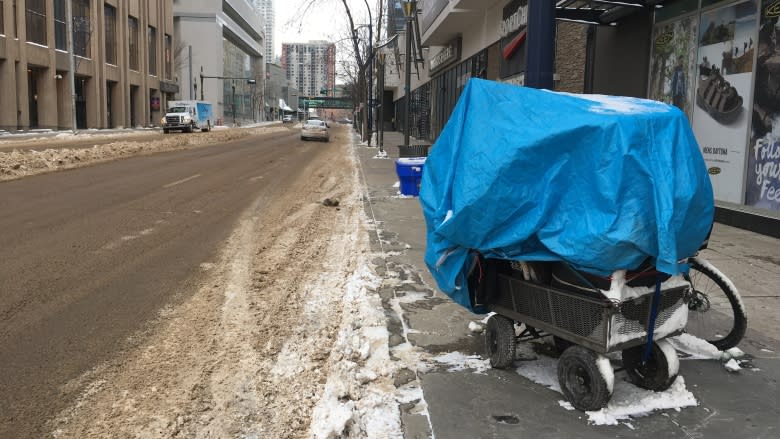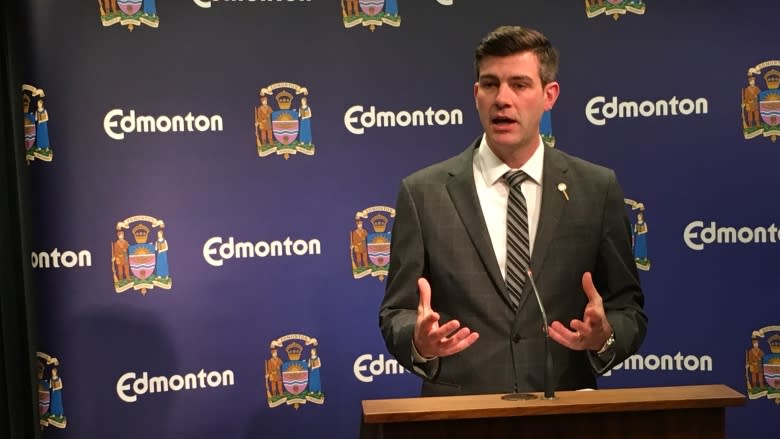Mayor wants more funding to get Edmonton homeless plan back on track
Edmonton Mayor Don Iveson is calling for big investments from the provincial and federal governments to help the city meet its goal to end homelessness by the end of 2020.
While Iveson said the plan has made significant strides since being launched in 2009, he said the other levels of government have not been as committed to it as he had hoped.
"Five or six years ago there was about $100 million of investment coming in from provincial and federal governments to build new housing units," Mayor Iveson explained in an interview with CBC News. "That declined to the point where the number was zero."
Edmonton's latest homeless count in Nov. 2016 identified 1,752 people as being homeless in the city.
That represented a 43-per-cent reduction in the number of people who were living on the street before the plan began in 2009.
Iveson said there is still work to do.
The plan, "A Place to Call Home," called for about $1 billion to be spent on supportive housing and 1,000 units to be created for those with nowhere else to go.
Today, only about one-quarter of those funds have been spent and only 213 permanent supportive housing units have been built — roughly one-fifth of the original target.
"There are three years left. If we can build them all in that period of time we can still end homelessness within that period of time," said Iveson.
The permanent supportive housing model is one that often requires staff to help those dealing with mental health issues and addictions.
Unlikely that plan can meet its goals in time
Iveson said Edmonton is hoping to see a new commitment from both the provincial and federal governments in their upcoming budgets.
Mayor Iveson said funding levels from the provincial government are gradually bouncing back but Edmonton is still hoping for about $200 million in combined new funds from the province and the feds to tackle the issue.
Iveson said he is hoping for those funds to be in the region of $21 million per year for the next 10 years.
While it's a big ask, Iveson said funds devoted to affordable housing will lead to a reduction in the number of hospital visits that often happen with people living on the street.
But even if the money was made available today, those who work with the homeless on the front lines say it's still unlikely the plan to end homelessness can meet its goals in the timeline that was originally set out.
"Even if we start investing today in a significant way, those units won't be up and operational in time to make that change," said Jordan Reiniger, program director with Boyle Street Community Services.
Reiniger said there are long wait lists for every supportive housing project and agrees with Mayor Iveson that building the remaining 800 units initially planned should be a major priority.
"A lot of the folks we're supporting are dealing with mental health challenges, substance dependence challenges and physical health challenges sometimes all at the same time," said Reiniger adding that housing with specialized staffing and support can help in those cases.
15,000 Albertans waiting for affordable housing
Reiniger said the plan to end homelessness has led to new strategies which have made a difference.
As part of its final push over the next three years, the city is asking Edmontonians to fill out a survey on its endhomelessnessyeg.ca website looking for new ideas and feedback about how the program is going.
"I think Edmontonians' commitment to this work is very strong," said Iveson.
The Notley government said it remains committed to dealing with the homeless issue and has been increasing funding levels since coming to power in 2015.
A spokesperson for the department of Community and Social Services said funding for supportive housing programs has doubled from 2009 levels to $77 million in 2016.
In addition, the Alberta government said it has increased funds to the group Homeward Trust which supports housing projects in Edmonton.
The province said 15,000 Alberta families are currently on a waiting list for affordable housing. It said it intends to spend $1.2 billion over the next five years to build new affordable housing units throughout the province.



